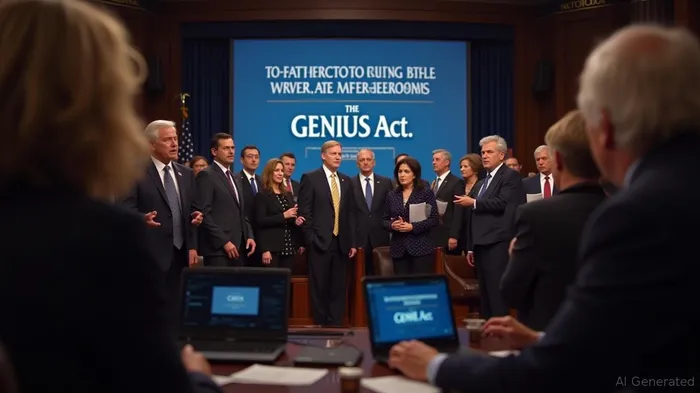GENIUS Act Aims to Regulate Stablecoins with Bipartisan Support
The GENIUS Act, a piece of legislation focused on stablecoin regulation, is poised to become the first bipartisan legislation to pass through the U.S. Congress in years. This development is significant for the cryptocurrency industry, which has long sought clear regulatory frameworks. The GENIUS Act aims to establish rules for stablecoins, a type of cryptocurrency designed to maintain a stable value, typically pegged to a fiat currency like the U.S. dollar. Stablecoins are crucial for the functioning of the broader crypto market, facilitating trading, lending, and payments.
Effective stablecoin regulation is seen as essential for several reasons. It can ensure financial stability by mitigating risks to the traditional financial system, protect consumers from potential fraud or mismanagement, foster market integrity and trust, and prevent illicit finance. The push for the GENIUS Act underscores a growing recognition in Washington D.C. that ignoring digital assets is no longer an option. The proposed legislation aims to provide clarity on how stablecoins should be issued, managed, and supervised.
David Sacks, a prominent figure in crypto policy and venture capital, highlighted the potential of the GENIUS Act in a recent statement. He pointed out that the bill is being discussed as potentially the first piece of significant bipartisan legislation to pass in a long time, indicating the perceived urgency and potential consensus surrounding stablecoin regulation. Bipartisan legislation is rare due to political divisions, but its potential passage suggests a shared understanding across the political spectrum regarding the need for action. Compromises have likely been made to address concerns from both sides, and the resulting law may be more robust and have broader support, potentially leading to more stable policy long-term.
For the crypto industry, David Sacks’ remarks offer hope that a functional regulatory framework, supported by both major parties, could finally materialize, ending some of the current uncertainty. The GENIUS Act is reportedly up for a final vote in the US Senate crypto discussions on June 17. This date marks a critical moment for the legislation and for the future of stablecoin regulation in the United States. A successful vote would move the bill closer to becoming law, potentially setting a precedent for how other digital assetDAAQ-- classes might be regulated in the future.
Market participants, policymakers, and crypto enthusiasts are watching the US Senate crypto proceedings closely. The outcome of this vote will signal whether Congress is ready to provide the regulatory clarity that the industry has been advocating for. It will also test the willingness of politicians from opposing parties to work together on complex, emerging technologies. While the prospect of bipartisan legislation is positive, the specifics of the GENIUS Act are what will ultimately determine its impact. Potential benefits could include increased institutional adoption of stablecoins, greater innovation within a clear legal framework, enhanced trust and confidence among consumers and businesses using stablecoins, and strengthening the U.S. position in the global digital asset landscape.
However, challenges and potential drawbacks also exist. The specific requirements of the regulation could be overly burdensome for smaller stablecoin issuers, defining which entities fall under the regulation’s scope could be complex, balancing innovation with necessary safeguards is a delicate act, and the bill’s passage is not guaranteed, despite the positive outlook shared by figures like David Sacks. The details hammered out in the legislative process, and the outcome of the US Senate crypto vote, will reveal how these potential benefits and challenges are addressed.
For anyone interested in the crypto space, particularly stablecoin regulation, the upcoming period is critical. It is important to monitor the US Senate Crypto Vote, understand the details of the legislation, assess the impact on different types of stablecoins and the broader crypto market, follow bipartisan developments, and listen to experts. The prospect of the GENIUS Act passing as significant bipartisan legislation represents a potential turning point for stablecoin regulation in the United States. With a crucial vote approaching in the US Senate crypto discussions on June 17, the coming days are vital. While challenges remain, the possibility of Congress finding common ground on this critical aspect of digital finance offers hope for greater clarity and stability in the market. The outcome will not only shape the future of stablecoins but could also signal a new era of congressional engagement with the crypto industry.

Quickly understand the history and background of various well-known coins
Latest Articles
Stay ahead of the market.
Get curated U.S. market news, insights and key dates delivered to your inbox.



Comments
No comments yet